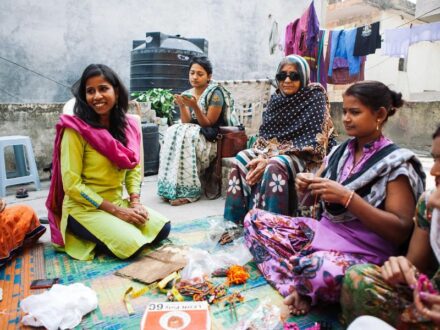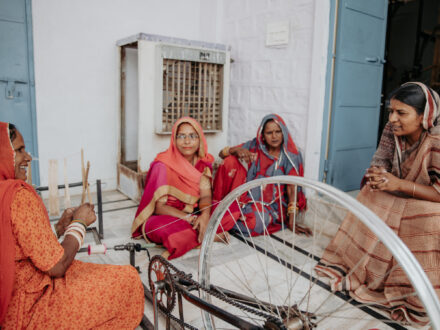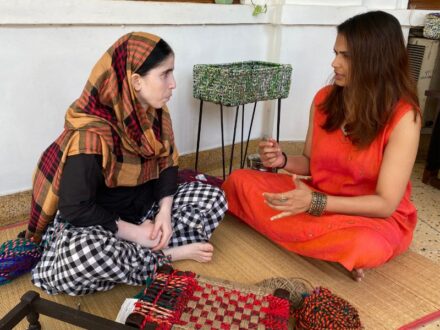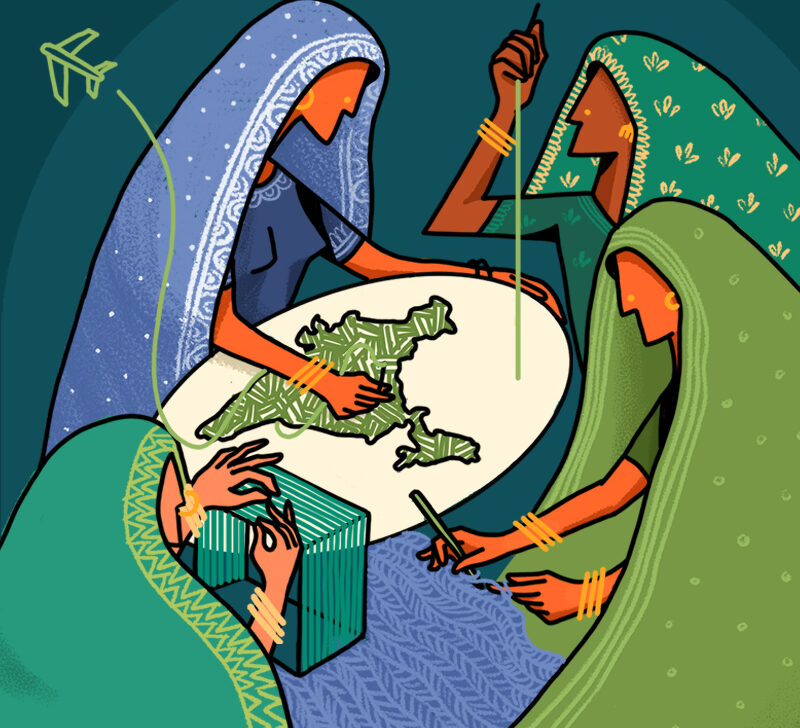An empowered woman assumes multiple roles today - yet their common visualizations center around glamorous and assertive figures commanding boardrooms in their power suits. By discovering stories of craftswomen from the diverse and rural corners of India, a shift in perspective follows- that empowerment encapsulates not one but many definitions. And in their journey, three distinct and inspiring female founders of social enterprises have played pivotal roles. Through reviving traditional handcrafting techniques with a modern context and leveraging their diverse professional backgrounds, these entrepreneurs are not only elevating the works of female artisans from the grassroots to global platforms but, along the way, also reshaping our traditional perceptions - of what it means to be an empowered woman today. In an insightful and fascinating conversation, Blur The Border delved into the compelling journeys of the founders of Saheli, Sirohi, and Samoolam, and the driving forces that have transformed the lives of countless women. Here, at one end of the spectrum, are women who have been denied education and work opportunities, while on the other, stand three female founders whose roster boasts of extensive experience and education. And yet, they are equally empowered, forging a powerful synergy that uplifts each other along the way.
"I was struck by how the women in my village were making agarbattis at home for 4-5 rupees per day and engaging their toddlers in the process too."
- Usha Varia, Founder-Samoolam

Before a steadfast journey as the founder of Saheli Women - a non-profit social enterprise founded in 2015 in the village of Bikhamkhor, Rajasthan - Madhu Vaishnav spent three months at the University of Berkeley in California, studying international human rights and social work practice. Today, while teaching age-old techniques that stand at the core of Indian craftsmanship to the women in their centers, Saheli crafts ethical and sustainable contemporary garments for over 22 international brands. While doing so, the enterprise fosters a space for rural women and their children, underscoring the need for gender equality.
Gauri Malik was dabbling in a lucrative career in finance and consulting before she founded Sirohi in 2021 -a sustainable and luxury home decor and lifestyle brand that has today become a family of 550+ women artisans who are economically independent. Using traditional Indian hand-woven and craft techniques, and employing organic materials such as jute and cotton, the women of Sirohi, who come from marginalized backgrounds, furnish world-class charpais, stools, and other essentials that turn homes into havens.
Meanwhile, before Usha Varia - a graduate of the National Institute of Design -founded Samoolam in 2009, a self-sustaining grassroots social enterprise empowering women through crochet lifestyle products, she was conducting workshops on sustainable design across South Asia. At a time when crochet as jewelry was considered an unusual concept, Usha established an enterprise that is not only redefining the traditional perception of jewelry but also creating sustainable livelihood opportunities for economically disadvantaged rural women in Gaya, Bihar. But, as these three women leverage the power of textile and age-old crafts, to uplift women from conservative communities and take the artisans' labor onto prestigious platforms including several international ones - it all began with a compelling personal journey.

"While there is considerable poverty in the village, I didn't encounter a single person resorting to begging"
- Madhu Vaishnav, Founder-Saheli Women
Photo credit: Robin Hooybergs at Indigenius
While each of the founders has made a significant impact through their enterprises, what led up to the inception of Samoolam, Sirohi, and Saheli was shaped by profound personal encounters. Usha was struck by the stark disparity between the expensive coffee in her hand and the women of her village making ends meet with a meager income. “They were making agarbattis at home for 4-5 rupees per day and engaging their toddlers in the process too”, she continues, explaining how the incident left a lasting impression on her and became one of the founding reasons for Samoolam’s existence.
Meanwhile, Gauri recalls a horrifying incident, “I personally witnessed weddings of girls aged 13-15 years, in the village of Haryana without being able to do anything about it. These young girls were not educated, and their parents were scared to send them to school, because of the crime in the area. That's when things turned around and I took a step back to understand more about the development sector.” says Gauri, addressing how the experience led to Sirohi, an enterprise that has transformed the lives of more than 500 women today - including ones who would have been subjected to child marriage otherwise.
For Madhu, however, the experience was remarkably distinct, which left her deeply moved during her visit to the village of Bhikamkhor. "While there is considerable poverty in the village, I didn't encounter a single person resorting to begging”. Madhu explains, further elaborating on how, despite their limited resources, the villagers extend their hospitality and generously share what they can amongst themselves. "There is a lot of confidence and dignity, and I loved that about our culture", she concludes explaining how she wanted to build on their innate humility and went on to establish Saheli.
"Growing up, I was constantly grappling with this dichotomy that I was living two distinct lives. At school, where we were free from the notions of gender inequality but I returned home to a stark contrasting reality."
- Gauri Malik, Founder-Sirohi

In addition to this, even traditional gender roles and societal constructs didn't spare Gauri and Madhu. Both the founders, found themselves entangled in personal struggles, that may have brought minor hindrances but played detrimental roles in shaping their journeys. Throughout her life, Gauri had witnessed the financial dependence of educated women in her own family. “My school and home were two different worlds and growing up I was constantly grappling with this dichotomy that I was living two distinct lives. At school, we were free from the notions of gender inequality but I returned home to a stark contrasting reality.”, says Gauri, interpreting how this made her question her own path, whether to pursue the career she had chosen for herself or to follow her passion to empower women and promote development.
Meanwhile, for Madhu, it meant resisting the judgments of her own family, battling skeptical thoughts of how her actions, to establish a social enterprise might invite shame. "I was asked to wear a saree and cover my head while visiting Bikhamkhor, and even today, I still cover my head," she reflects in acceptance and ponders on how she found a balance. The dupatta gracefully draped over her head today serves as a symbolic nod to traditions and customs, while her rebellious spirit finds its purpose in empowering women and enlightening their families about the immense value of self-independence.
As Usha's career advanced, and her travels took her to various countries, she was startled to encounter the enduring presence of caste hierarchies in her village. Originally, she had planned to explore textile jewelry crafted from discarded saree scraps and involve the women in her community in this craft. However, she later shifted her focus to crochet, avoiding the use of recycled clothing due to concerns about traditional perceptions regarding caste and untouchability.
Today, as dedicated craftsmanship and empowerment emerge out of Sirohi, Samoolam, and Saheli despite the obstacles and resistance from societal constructs, it is not only the personal journeys of Madhu, Usha, and Gauri that are noteworthy but also the profound impact they have had on the female artisans who have become an integral part of the enterprises driving transformative changes through empowerment - they are not considered employees but rather a family and a community. With this perspective in mind, our upcoming article shifts the spotlight toward the transformative journey of the artisans, unveiling a chain reaction of change and exploring how textile and craftsmanship have evolved into catalysts for empowering women and more.
